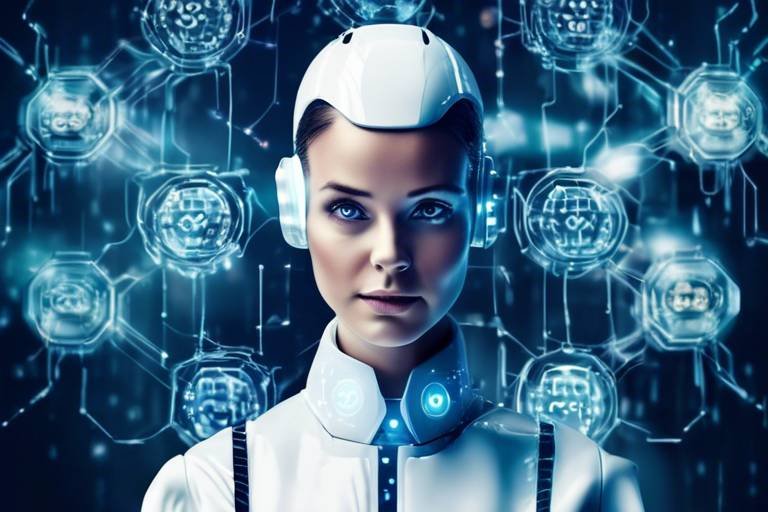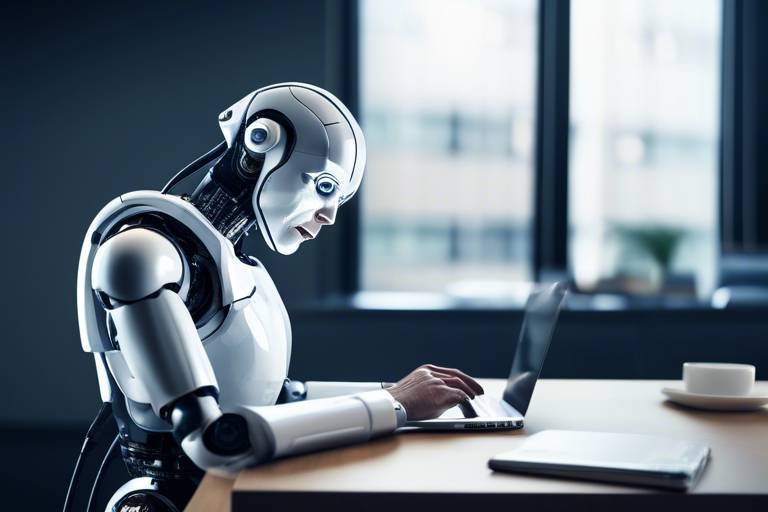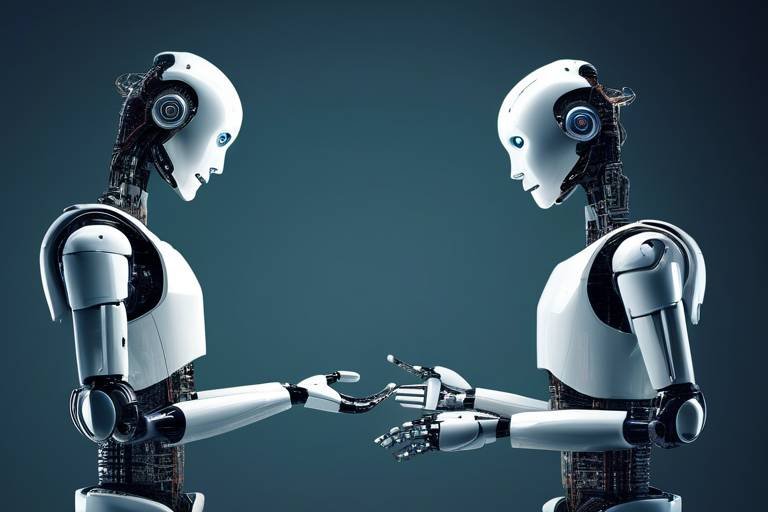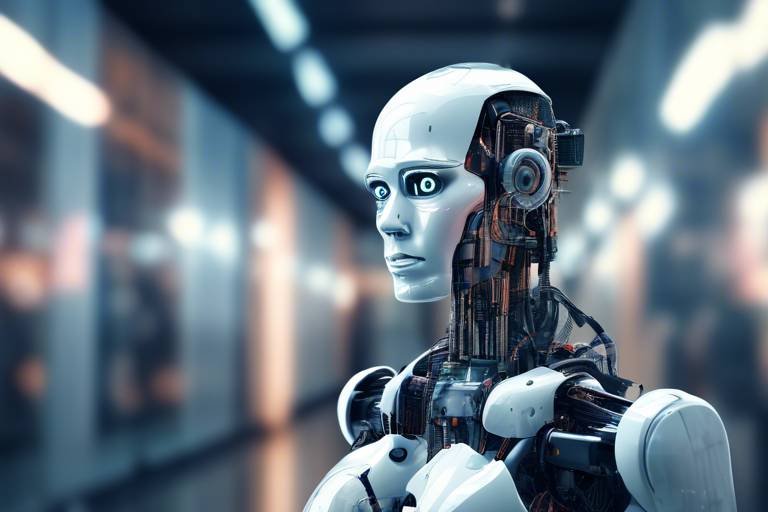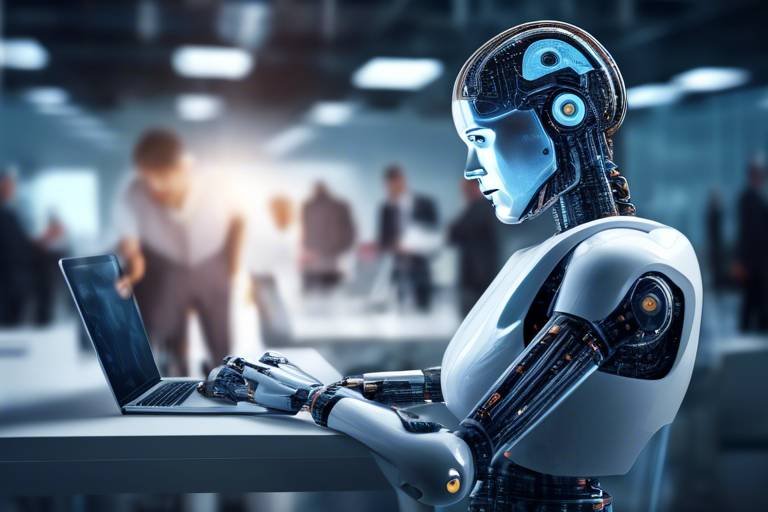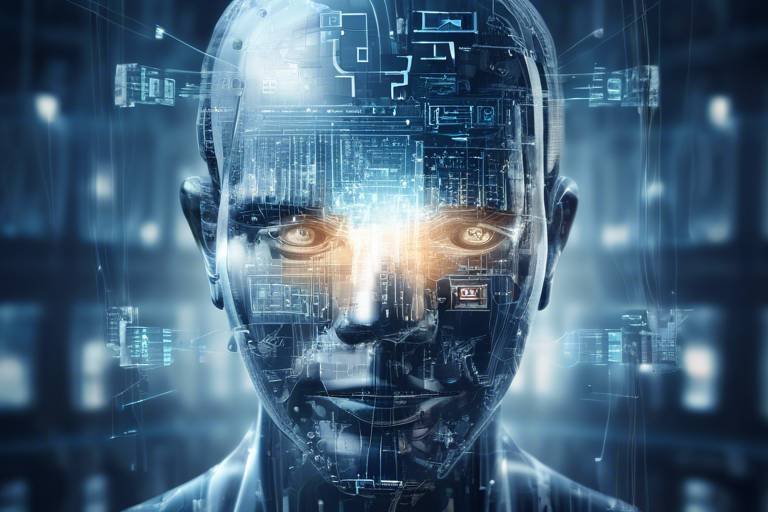The Growing Value of AI in the Future Job Market
The landscape of the job market is shifting dramatically, and at the forefront of this transformation is artificial intelligence (AI). Imagine a world where machines not only assist but also enhance human capabilities, making jobs more efficient and innovative. The growing value of AI is not just a trend; it's a profound shift that is reshaping how we work, what skills we need, and even the types of jobs that will exist in the future. As AI technologies continue to evolve, they are becoming integral to various industries, driving both job creation and displacement. The question is, how can we prepare for this new reality?
AI is not a distant concept; it's already here, influencing everything from healthcare to finance, and even our daily work routines. For instance, consider how AI-driven tools are streamlining processes, improving decision-making, and providing insights that were once unimaginable. This technological evolution is akin to the industrial revolution, where the introduction of machinery dramatically changed labor dynamics. Today, the rise of AI presents both challenges and opportunities, making it crucial for workers to adapt and acquire new skills.
As we delve deeper into this topic, we will explore the impact of AI on employment, the essential skills needed for an AI-driven workforce, and the transformative role of AI across various industries. By understanding these elements, individuals can position themselves to thrive in an economy increasingly dominated by artificial intelligence. So, buckle up! The future job market is not just about survival; it's about leveraging AI to unlock new potentials and redefine what work can be.
AI's influence on job creation and displacement is profound. Understanding how AI technologies reshape roles can help workers adapt and thrive in an evolving job landscape. While some fear that AI will replace jobs, the reality is that it often leads to the creation of new roles that require different skill sets. For example, as AI takes over repetitive tasks, the demand for AI specialists, data analysts, and cybersecurity experts is on the rise. This shift requires a proactive approach to learning and development.
As AI continues to integrate into various sectors, specific skills are becoming essential. Identifying these skills will empower individuals to remain competitive and relevant in the future job market. The skills can be broadly categorized into technical skills and soft skills. While technical skills are crucial for operating AI technologies, soft skills foster creativity and collaboration, which are equally important in an AI-enhanced workplace.
Proficiency in programming, data analysis, and machine learning are increasingly sought after. These technical skills are vital for individuals aiming to excel in AI-centric roles. For instance, programming languages like Python, R, and Java are foundational for developing AI applications and performing data analysis. Understanding data visualization and statistical analysis is also essential, as these techniques enable professionals to interpret AI-generated insights effectively.
Familiarity with languages such as Python, R, and Java is crucial. These languages provide the tools necessary for developing robust AI applications. Python, in particular, is favored for its simplicity and versatility, making it a great starting point for those new to programming.
Understanding data visualization and statistical analysis is essential. These techniques enable professionals to interpret AI-generated insights effectively. By mastering these skills, individuals can make informed decisions that drive business success.
In addition to technical expertise, soft skills such as creativity, critical thinking, and emotional intelligence are vital. These skills complement AI capabilities and enhance teamwork and innovation. For example, while AI can analyze data at lightning speed, it is human intuition and creativity that can turn those insights into actionable strategies. In a world where machines handle routine tasks, the ability to think critically and creatively will set individuals apart.
Various industries are undergoing significant changes due to AI integration. Exploring these transformations helps illustrate the technology's broad impact on the job market. From healthcare to finance, AI is not just a tool; it's a game changer that is redefining industry standards and practices.
AI is revolutionizing healthcare through improved diagnostics and personalized treatment plans. Understanding these innovations highlights the growing demand for AI-savvy professionals in this sector. For instance, AI algorithms can analyze medical images faster and more accurately than human radiologists, leading to quicker diagnoses and better patient outcomes.
The finance industry leverages AI for risk assessment and fraud detection. Professionals equipped with AI knowledge are increasingly valuable in this rapidly evolving field. As financial institutions adopt AI-driven tools for data analysis, the need for experts who can interpret and act on these insights will continue to grow.
AI is reshaping remote work dynamics by enhancing collaboration tools and automating tasks. Understanding this shift is crucial for adapting to the future workplace. As more companies embrace remote work, AI technologies will play a pivotal role in ensuring teams remain connected and productive.
AI-driven platforms facilitate seamless communication and project management. Familiarity with these tools is essential for remote teams aiming for efficiency and productivity. For instance, tools that utilize machine learning can help prioritize tasks and streamline workflows, allowing teams to focus on what truly matters.
AI technologies are automating repetitive tasks, allowing employees to focus on higher-value work. Embracing this change can lead to more fulfilling job roles where creativity and strategic thinking take center stage. By letting AI handle mundane tasks, workers can invest their time in areas that require human insight and innovation.
- How will AI affect job availability? AI may displace some jobs but will also create new roles that require different skills.
- What skills should I develop for an AI-driven job market? Focus on both technical skills like programming and data analysis, as well as soft skills like creativity and emotional intelligence.
- Is it too late to learn about AI? It's never too late! Many resources are available for learning AI and its applications, regardless of your current skill level.

The Impact of AI on Employment
The rise of artificial intelligence (AI) is not just a technological shift; it's a seismic change in the way we view employment. Imagine walking into a world where machines not only assist us but also take on roles that were once the exclusive domain of humans. This transformation brings with it both opportunities and challenges. As AI technologies evolve, they are reshaping job descriptions, creating new roles, and even rendering some positions obsolete. This duality of AI's impact can be likened to a coin with two sides, where one side shines with potential and the other casts shadows of uncertainty.
One of the most significant effects of AI on employment is the phenomenon of job displacement. As AI systems become more adept at performing tasks traditionally done by humans, there is a growing concern about the future of various professions. For instance, jobs in manufacturing, data entry, and even customer service are increasingly being automated. According to a recent study, it's estimated that by 2030, up to 30% of jobs could be affected by AI and automation. However, it's crucial to recognize that while some jobs may disappear, new ones are also being created. This is where the opportunity aspect comes into play.
AI's integration into the workforce is also leading to the emergence of entirely new job categories. Roles like AI ethics compliance officers, data scientists, and machine learning engineers are becoming commonplace. These jobs require a different set of skills, highlighting the need for workers to adapt and upskill. It's a bit like a game of musical chairs; as some chairs are removed, new ones are added, and those who are quick to adapt will find a seat. The key takeaway here is that while AI may eliminate certain jobs, it simultaneously creates a demand for new skills and roles.
Moreover, AI is enhancing productivity across various sectors. For instance, in industries such as healthcare and finance, AI tools are assisting professionals in making data-driven decisions faster and more accurately. This not only streamlines operations but also allows workers to focus on more complex and rewarding tasks. Consider this: instead of spending hours sifting through data, a healthcare professional can now leverage AI to analyze patient records and identify trends, ultimately leading to better patient outcomes. This shift is not just about replacing jobs; it's about transforming them into something more meaningful.
To navigate this evolving landscape, workers must embrace lifelong learning. The ability to adapt and acquire new skills will be paramount in an AI-driven economy. This means that individuals should actively seek out opportunities for training and education in AI-related fields. Whether it’s through formal education, online courses, or self-directed learning, the responsibility lies with each worker to stay relevant. In essence, the job market is becoming a dynamic ecosystem where flexibility and adaptability are the new currency.
In conclusion, the impact of AI on employment is profound and multifaceted. While it poses challenges in terms of job displacement, it also opens doors to new opportunities and roles that didn't exist a decade ago. The key for workers is to remain vigilant, adaptable, and proactive in acquiring the skills necessary to thrive in this new landscape. Embracing change rather than resisting it will be the mantra for success in an AI-enhanced job market.

Skills for the AI-Driven Workforce
The rise of artificial intelligence (AI) is not just a trend; it’s a revolution that’s reshaping the workforce landscape. As we dive deeper into this AI-driven era, understanding the essential skills needed to thrive becomes paramount. Imagine the workforce as a vibrant ecosystem where both technical and soft skills play crucial roles in ensuring survival and success. Just like a well-balanced diet is important for our health, a mix of skills is vital for career resilience in an AI-infused world.
First off, let’s talk about the technical skills. These are the building blocks that enable professionals to engage with AI technologies effectively. Proficiency in programming languages such as Python, R, and Java is increasingly sought after. Why? Because these languages are the backbone of AI development. They allow individuals to create algorithms, analyze data, and build machine learning models. Think of them as the toolkit that every AI practitioner must have in their toolbox.
But learning programming languages is just the beginning. Understanding data analysis techniques is equally important. Professionals need to be adept at data visualization and statistical analysis to interpret AI-generated insights effectively. In a world overflowing with data, being able to sift through and make sense of it is like finding a needle in a haystack. Those who can master this skill will be the ones who can extract valuable insights that drive decision-making processes.
Now, while technical skills are crucial, they are not the whole story. In fact, in an AI world, soft skills are becoming more important than ever. Skills such as creativity, critical thinking, and emotional intelligence are what will set individuals apart. AI can analyze data and automate tasks, but it lacks the human touch that fosters collaboration and innovation. For instance, creativity is needed to envision new applications for AI, while emotional intelligence helps in navigating team dynamics and understanding client needs.
To put it simply, the workforce of the future will require a blend of both technical and soft skills. Here’s a quick overview of the essential skills:
| Skill Type | Examples | Importance |
|---|---|---|
| Technical Skills | Programming (Python, R, Java), Data Analysis | Foundation for AI development and data interpretation |
| Soft Skills | Creativity, Critical Thinking, Emotional Intelligence | Enhances teamwork, innovation, and client relations |
In conclusion, as we forge ahead into the AI-driven future, individuals who invest in developing a diverse skill set will find themselves at a distinct advantage. It’s not just about knowing how to code or analyze data; it’s about being adaptable, innovative, and emotionally intelligent. The future belongs to those who can blend technology with human insight, creating a workforce that is not only efficient but also empathetic and creative.

Technical Skills in Demand
In today’s fast-paced job market, technical skills are not just an advantage; they are a necessity. As artificial intelligence continues to evolve and permeate various sectors, the demand for skilled professionals who can navigate this landscape is skyrocketing. Employers are looking for individuals who not only understand AI technology but can also apply it to solve real-world problems. This shift is reshaping the job market, making it crucial for workers to enhance their skill sets accordingly.
Among the most sought-after technical skills are programming, data analysis, and machine learning. Each of these areas plays a pivotal role in the development and implementation of AI solutions. For instance, programming is the backbone of any AI application, enabling developers to create algorithms that can learn and adapt. Without proficient programmers, the advancements in AI would be stunted. Moreover, as businesses increasingly rely on data-driven decisions, the ability to analyze and interpret data has become indispensable. Professionals who can transform raw data into actionable insights are invaluable assets to any organization.
Let’s break down some of these essential skills further:
| Skill | Description | Importance |
|---|---|---|
| Programming | Writing code to develop AI applications and algorithms. | Foundational for building AI systems. |
| Data Analysis | Interpreting complex data sets to inform decision-making. | Critical for leveraging AI insights effectively. |
| Machine Learning | Creating algorithms that enable computers to learn from data. | Essential for developing intelligent systems. |
Additionally, familiarity with specific programming languages is paramount. Languages like Python, R, and Java are particularly valuable in the AI domain. Python, for example, is renowned for its simplicity and robust libraries, making it a favorite among data scientists and AI developers. R is often used in statistical analysis, while Java’s versatility allows for the development of complex AI applications. By mastering these languages, individuals can significantly boost their employability in the tech-driven job market.
Furthermore, understanding data analysis techniques is equally crucial. Analyzing data is not just about crunching numbers; it involves data visualization and statistical analysis. Professionals skilled in these areas can communicate their findings effectively, helping organizations make informed decisions based on AI-generated insights. In a world where data is the new oil, those who can harness its power will undoubtedly stand out in the crowd.
In summary, as we plunge deeper into an AI-driven future, the technical skills that are in demand are not just limited to programming or data analysis. They encompass a broad spectrum of competencies that empower individuals to thrive in this evolving landscape. By investing time in developing these skills, professionals can ensure they remain relevant and competitive in a job market that is increasingly shaped by technology.
- What are the most important technical skills for AI jobs?
The most important skills include programming, data analysis, and machine learning. Mastery of these areas can significantly enhance your employability in AI-related roles.
- Which programming languages should I learn for a career in AI?
Python, R, and Java are highly recommended due to their widespread use in AI development and data analysis.
- How can I improve my data analysis skills?
Consider taking online courses, participating in workshops, or working on real-world projects that require data analysis to enhance your skills.

Programming Languages to Learn
In today's tech-driven world, learning programming languages is not just a trend but a necessity, especially for those looking to thrive in the AI-driven job market. Among the myriad of programming languages available, a few stand out as essential for anyone aiming to make a mark in artificial intelligence and related fields. Python, R, and Java are at the forefront of this revolution, each offering unique advantages that cater to different aspects of AI development.
Python is often hailed as the go-to language for AI and machine learning. Its simplicity and readability make it accessible for beginners while still being powerful enough for advanced users. With a rich ecosystem of libraries such as TensorFlow and PyTorch, Python allows developers to build complex AI models with ease. This versatility is why many educational institutions and online courses emphasize Python as the first language to learn.
On the other hand, R is particularly favored in the realm of data analysis and statistics. If you’re looking to dive deep into data visualization and statistical modeling, R is your best friend. It offers an array of packages that make it easier to handle large datasets and extract meaningful insights. As businesses increasingly rely on data-driven decision-making, proficiency in R can set you apart from the competition.
Java, while not as trendy as Python or R, still holds significant value, especially in large-scale applications. Its robustness and scalability make it an excellent choice for developing AI applications that require high performance and reliability. Moreover, Java's extensive use in enterprise environments means that being proficient in it can open doors to numerous job opportunities.
To summarize, here’s a quick comparison of these programming languages:
| Language | Best For | Key Libraries/Frameworks |
|---|---|---|
| Python | Machine Learning, AI | TensorFlow, PyTorch, Scikit-learn |
| R | Data Analysis, Statistics | ggplot2, dplyr, caret |
| Java | Enterprise Applications | Weka, Deeplearning4j |
Understanding these programming languages is crucial for anyone looking to excel in the AI landscape. Each language has its strengths, and choosing the right one depends on your career goals and the specific area of AI that interests you. Whether you are leaning towards machine learning, data analysis, or enterprise solutions, mastering these languages will equip you with the tools necessary to navigate the complexities of the AI-driven future.
- Why is Python so popular for AI development? - Python's simplicity, combined with its powerful libraries, makes it ideal for both beginners and experienced developers in AI.
- Is R better than Python for data analysis? - R is specifically designed for statistical analysis and data visualization, making it a strong choice for data-centric roles, though Python is also widely used.
- Can I learn multiple programming languages at once? - While it's possible, it's often more effective to focus on one language at a time to build a strong foundation before branching out.

Data Analysis Techniques
In today's data-driven world, mastering is not just an option; it's a necessity. As artificial intelligence continues to permeate various industries, the ability to interpret and manipulate data effectively can set you apart from the competition. But what exactly does this entail? Let's dive into some of the most crucial techniques that every professional should be familiar with.
First and foremost, data visualization stands out as a vital skill. Imagine trying to explain complex data findings to a room full of people. If you simply throw numbers at them, chances are they’ll be lost in a sea of statistics. However, if you present that data in a visually appealing format—like graphs, charts, or infographics—it becomes much easier for your audience to grasp the insights. Tools like Tableau and Power BI have made it simpler than ever to turn raw data into compelling visual stories.
Next up is statistical analysis. This technique allows you to make sense of data by applying various statistical methods to draw meaningful conclusions. Whether it's understanding trends, making predictions, or testing hypotheses, statistical analysis provides the backbone for decision-making in any organization. Familiarity with concepts such as regression analysis, hypothesis testing, and correlation can significantly enhance your analytical capabilities.
Moreover, understanding predictive analytics is becoming increasingly important. With the help of machine learning algorithms, professionals can analyze historical data to make predictions about future outcomes. This technique is widely used across various sectors, from marketing to finance, helping businesses anticipate customer behavior and optimize their strategies accordingly.
To give you a clearer picture of these techniques, here’s a simple comparison table:
| Technique | Description | Common Tools |
|---|---|---|
| Data Visualization | Transforming data into visual formats for easier interpretation. | Tableau, Power BI, Google Data Studio |
| Statistical Analysis | Applying statistical methods to understand data trends and make predictions. | R, Python (pandas, NumPy), SPSS |
| Predictive Analytics | Using historical data to forecast future outcomes. | IBM SPSS, SAS, RapidMiner |
Lastly, it's essential to grasp the concept of data cleaning. Before any analysis can take place, data must be accurate, complete, and consistent. This involves identifying and correcting errors, removing duplicates, and ensuring that the data set is reliable. Without proper data cleaning, your analysis could lead to faulty conclusions, which can be detrimental in an AI-driven economy.
In summary, mastering these data analysis techniques not only enhances your skill set but also positions you as a valuable asset in the ever-evolving job market. As AI technologies continue to advance, the demand for professionals who can interpret and leverage data will only grow. So, are you ready to embrace the world of data analysis?
- What is data analysis? Data analysis involves inspecting, cleaning, and modeling data to discover useful information, inform conclusions, and support decision-making.
- Why is data visualization important? Data visualization helps convey complex data insights in a clear and effective manner, making it easier for stakeholders to understand and act upon.
- What tools are best for statistical analysis? Popular tools include R, Python (with libraries such as Pandas and NumPy), and SPSS, which offer a range of statistical functions and capabilities.

Soft Skills in an AI World
In an age where artificial intelligence is rapidly transforming the workplace, the significance of soft skills cannot be overstated. While technical skills are undoubtedly crucial for navigating AI technologies, it's the soft skills that truly set individuals apart in an increasingly automated environment. Think of soft skills as the glue that holds teams together, fostering collaboration and creativity amidst the cold efficiency of machines. So, what are these essential soft skills that will help you thrive in an AI-driven world?
First and foremost, creativity is becoming a prized asset. As AI takes over routine tasks, the ability to think outside the box and come up with innovative solutions is invaluable. Imagine a world where machines handle the mundane, leaving humans free to explore new ideas and concepts. This shift not only enhances job satisfaction but also drives business growth through fresh perspectives and original thinking.
Next up is critical thinking. In a landscape filled with data and AI-generated insights, being able to analyze information critically is essential. Professionals who can sift through the noise, identify patterns, and make informed decisions will be in high demand. It's like being a modern-day detective, piecing together clues to solve complex problems that AI alone cannot address.
Emotional intelligence is another soft skill that is becoming increasingly relevant. As AI takes on more tasks, the human touch remains irreplaceable, especially in roles that require empathy and understanding. Emotional intelligence allows individuals to connect with colleagues and clients on a deeper level, fostering trust and collaboration. In a world where machines can process data but lack emotional depth, those who can navigate interpersonal relationships effectively will shine.
Moreover, effective communication skills are essential in an AI world. The ability to articulate ideas clearly and collaborate with diverse teams is more important than ever. As remote work becomes the norm, being able to convey thoughts and feedback effectively through digital platforms can make or break a project. It's like being a bridge that connects various islands of expertise, ensuring everyone is on the same page.
Finally, adaptability is key. The pace of change in the AI landscape is staggering, and professionals who can embrace new technologies and adjust their approaches will thrive. This flexibility is akin to being a chameleon, able to blend into different environments and respond to shifting demands. In a world where the only constant is change, those who can pivot quickly will find themselves ahead of the curve.
In summary, while technical skills are essential for navigating the AI landscape, soft skills such as creativity, critical thinking, emotional intelligence, communication, and adaptability are the real game-changers. By honing these skills, individuals can position themselves as invaluable assets in an AI-driven world, ensuring they remain relevant and competitive in the evolving job market.
- What are soft skills?
Soft skills are personal attributes that enable someone to interact effectively and harmoniously with other people. Examples include communication, teamwork, and problem-solving. - Why are soft skills important in an AI-driven world?
As AI handles more technical tasks, soft skills become crucial for collaboration, creativity, and emotional connections that machines cannot replicate. - How can I improve my soft skills?
Engage in team activities, seek feedback, practice active listening, and take part in workshops focused on communication and emotional intelligence.

AI's Role in Industry Transformation
Artificial Intelligence is not just a buzzword; it's a transformative force that is reshaping industries across the globe. From healthcare to finance, AI is revolutionizing how businesses operate, making processes more efficient and enhancing decision-making capabilities. Imagine a world where machines can analyze vast amounts of data in seconds, providing insights that would take humans days or even weeks to uncover. This is the reality that AI is creating, and it's changing the job landscape in profound ways.
One of the most significant transformations is happening in the healthcare sector. AI technologies are being implemented to improve diagnostics, enabling healthcare professionals to identify diseases earlier and more accurately than ever before. For instance, AI algorithms can analyze medical images to detect anomalies that may be missed by the human eye. This not only enhances patient outcomes but also increases the demand for AI-savvy professionals who can work alongside these advanced technologies.
In the finance industry, AI is playing a crucial role in risk assessment and fraud detection. Financial institutions are leveraging AI to analyze transaction patterns and identify suspicious activities in real-time. This not only helps in mitigating risks but also enhances customer trust. As a result, professionals equipped with AI knowledge are becoming increasingly valuable, as they can harness these technologies to improve financial services and ensure compliance with regulations.
Moreover, AI is also making waves in the manufacturing sector, where it is streamlining operations through predictive maintenance and automation. By analyzing data from machinery, AI can predict when a machine is likely to fail, allowing companies to perform maintenance before a breakdown occurs. This proactive approach not only saves costs but also minimizes downtime, leading to increased productivity. Workers in this space are now expected to understand AI systems and how to integrate them into existing workflows.
To illustrate the broad impact of AI on various industries, consider the following table:
| Industry | AI Application | Impact |
|---|---|---|
| Healthcare | Improved diagnostics | Faster and more accurate disease detection |
| Finance | Fraud detection | Enhanced security and trust in transactions |
| Manufacturing | Predictive maintenance | Reduced downtime and increased productivity |
| Retail | Personalized shopping experiences | Increased customer satisfaction and sales |
As we look to the future, it’s clear that AI will continue to play a pivotal role in transforming industries. Companies that embrace AI technologies will not only gain a competitive edge but will also create new job opportunities that require a blend of technical and soft skills. The key takeaway here is that understanding AI and its implications is no longer optional; it's essential for anyone looking to thrive in an ever-evolving job market.
- What industries are most affected by AI? AI is impacting various industries, including healthcare, finance, manufacturing, and retail, among others.
- How can I prepare for a job in an AI-driven industry? Focus on acquiring both technical skills, such as programming and data analysis, and soft skills like creativity and critical thinking.
- Will AI replace human jobs? While AI may automate certain tasks, it will also create new job opportunities that require human oversight and creativity.
- What are some examples of AI applications in healthcare? AI is used for improved diagnostics, personalized treatment plans, and predictive analytics to enhance patient care.

Healthcare Innovations
Artificial Intelligence (AI) is not just a buzzword; it's a game-changer, especially in the healthcare sector. Imagine walking into a clinic where the technology knows your medical history even before you do. That's the power of AI! It's transforming how healthcare professionals diagnose diseases, treat patients, and manage healthcare systems. With the ability to analyze vast amounts of data quickly and accurately, AI is paving the way for personalized medicine and predictive analytics.
One of the most exciting innovations is the use of AI in diagnostics. Traditional diagnostic methods can be time-consuming and sometimes inaccurate. However, AI algorithms can analyze medical images, such as X-rays and MRIs, with remarkable precision. For instance, a study showed that AI systems could outperform human radiologists in identifying certain types of cancers. This not only speeds up the diagnosis process but also improves patient outcomes significantly.
Moreover, AI is enhancing treatment plans tailored to individual patients. By analyzing genetic information and lifestyle factors, AI can suggest personalized treatment options that are more effective than one-size-fits-all approaches. This is particularly vital in areas like oncology, where treatment efficacy can vary greatly among patients. The future of medicine is becoming less about guesswork and more about data-driven decisions.
To illustrate the impact of AI in healthcare, consider the following table that highlights some key applications:
| Application | Description | Benefits |
|---|---|---|
| Diagnostic Imaging | AI analyzes medical images for abnormalities. | Faster and more accurate diagnoses. |
| Predictive Analytics | AI forecasts disease outbreaks and patient deterioration. | Proactive care and resource allocation. |
| Personalized Treatment | AI tailors treatment plans based on individual data. | Improved patient outcomes and satisfaction. |
As we delve deeper into AI's capabilities, we also see its potential in managing healthcare systems. AI can streamline administrative tasks, such as appointment scheduling and patient record management, allowing healthcare professionals to focus more on patient care. This not only enhances efficiency but also reduces operational costs, making healthcare more accessible to everyone.
However, with great power comes great responsibility. The integration of AI in healthcare raises important ethical questions, such as data privacy and the potential for bias in AI algorithms. It's crucial for healthcare providers to implement transparent practices and ensure that AI systems are trained on diverse datasets to avoid disparities in treatment.
In conclusion, the innovations driven by AI in healthcare are not just enhancing the way we diagnose and treat diseases but are also reshaping the entire healthcare landscape. As AI continues to evolve, it holds the promise of making healthcare more efficient, personalized, and accessible. The demand for skilled professionals who can navigate this AI-driven healthcare environment is growing, making it an exciting field for future job seekers.
- What are some examples of AI in healthcare?
AI is used in diagnostic imaging, predictive analytics, and personalized treatment plans. - How does AI improve patient outcomes?
By providing faster diagnoses and tailored treatment plans based on individual data. - Are there ethical concerns with AI in healthcare?
Yes, issues like data privacy and algorithmic bias need to be addressed. - What skills are needed to work with AI in healthcare?
Skills in data analysis, programming, and an understanding of healthcare systems are essential.

Finance and AI
The finance industry is experiencing a seismic shift, largely due to the integration of artificial intelligence (AI). This transformative technology is not just a passing trend; it's fundamentally reshaping how financial institutions operate, manage risks, and serve their customers. Imagine a world where algorithms can analyze vast amounts of data in seconds, identifying patterns and anomalies that a human might overlook. This is the reality that AI brings to finance, enhancing efficiency and accuracy in decision-making.
One of the most significant applications of AI in finance is in risk assessment. Traditional methods often rely on historical data and human intuition, which can be limiting. AI, on the other hand, uses machine learning to evaluate real-time data, allowing financial analysts to make more informed predictions about market trends and potential risks. For instance, AI systems can analyze credit scores, transaction histories, and even social media activity to assess a borrower's creditworthiness more comprehensively. This not only streamlines the lending process but also reduces the likelihood of defaults.
Furthermore, AI plays a crucial role in fraud detection. With the rise of online transactions, financial institutions are increasingly vulnerable to fraudulent activities. AI algorithms can monitor transactions in real-time, flagging any suspicious behavior based on predefined criteria. For example, if a customer's spending pattern suddenly changes—like a large purchase in a foreign country—an AI system can instantly alert the bank, prompting further investigation. This proactive approach not only protects customers but also saves financial institutions from potential losses.
In addition to risk management and fraud detection, AI is also revolutionizing customer service in finance. Chatbots and virtual assistants powered by AI are becoming commonplace, providing customers with immediate assistance and personalized recommendations. These tools can handle a wide range of inquiries, from simple account questions to complex investment advice, all while learning from interactions to improve over time. This not only enhances customer satisfaction but also allows financial advisors to focus on more complex tasks that require human expertise.
As the finance sector continues to embrace AI, the demand for professionals who are well-versed in these technologies is skyrocketing. Financial analysts, risk managers, and compliance officers who can leverage AI tools will be at a distinct advantage. It's not just about understanding finance anymore; it's about understanding how to harness the power of AI to drive better outcomes. Therefore, individuals looking to thrive in this evolving landscape should consider enhancing their skills in AI and data analytics.
To illustrate the impact of AI in finance, consider the following table that outlines some of the key applications:
| Application | Description | Benefits |
|---|---|---|
| Risk Assessment | AI analyzes real-time data to evaluate creditworthiness and market risks. | Improved accuracy and efficiency in lending decisions. |
| Fraud Detection | AI monitors transactions for suspicious activity. | Enhanced security and reduced financial losses. |
| Customer Service | AI-driven chatbots provide instant assistance to customers. | Increased customer satisfaction and operational efficiency. |
In conclusion, the integration of AI in finance is not just a trend; it is a necessary evolution for the industry. As AI continues to advance, financial professionals must adapt by acquiring new skills and embracing these technologies. The future of finance is not only about numbers but also about leveraging intelligent systems to create a more secure, efficient, and customer-centric industry.
- How is AI changing the finance industry? AI is enhancing risk assessment, fraud detection, and customer service, making processes more efficient and secure.
- What skills do I need to work in AI finance? Proficiency in data analysis, machine learning, and a strong understanding of financial principles are crucial.
- Are AI tools replacing jobs in finance? While AI automates certain tasks, it also creates new opportunities for skilled professionals who can leverage these technologies.

The Future of Remote Work and AI
As we stride into a new era, the combination of artificial intelligence (AI) and remote work is reshaping the workplace landscape in ways we could only dream of a few years ago. Imagine a world where your daily tasks are streamlined by intelligent systems that learn and adapt to your preferences. Sounds futuristic, right? But this is the reality we're heading towards. AI is not just a tool; it’s becoming a co-worker that enhances our capabilities, boosts productivity, and allows us to focus on what really matters.
The transition to remote work has been accelerated by the pandemic, and now, with AI at the helm, we are witnessing a transformation that is both exciting and daunting. AI-driven platforms are revolutionizing how we communicate and collaborate. For instance, tools like Slack and Trello are integrating AI features that help prioritize tasks, manage workflows, and even predict project completion times. This means that teams can work smarter, not harder, and stay connected regardless of their physical locations.
But what does this mean for the average worker? First, there’s a growing need for individuals to familiarize themselves with these AI tools. Understanding how to leverage AI for enhanced communication and project management is becoming essential. For example, AI can analyze team performance and suggest improvements, which can lead to more efficient workflows. This is not just about using technology; it’s about embracing a mindset shift where AI is seen as an ally rather than a competitor.
Moreover, AI is automating routine tasks that once consumed valuable time. Tasks such as scheduling meetings, managing emails, and even data entry are increasingly being handled by AI systems. This shift allows employees to redirect their focus toward more strategic and creative endeavors. Imagine being able to dedicate more time to brainstorming innovative ideas or solving complex problems instead of getting bogged down by mundane tasks. It’s like having a personal assistant who never tires!
However, with these advancements come challenges. The reliance on AI tools raises questions about job security and the necessity for continuous learning. As AI takes over more routine tasks, workers must adapt by upskilling and reskilling to remain relevant in their roles. The key to thriving in this AI-driven remote work environment lies in embracing lifelong learning and being open to change.
In conclusion, the future of remote work intertwined with AI is not just about technology; it’s about creating a more fulfilling work experience. As we navigate this exciting landscape, it’s crucial for individuals and organizations to invest in understanding and utilizing AI tools effectively. The possibilities are limitless, and those who adapt will undoubtedly find themselves at the forefront of this new era.
- How is AI changing remote work? AI is enhancing collaboration, automating routine tasks, and improving communication, allowing teams to work more efficiently from anywhere.
- What skills do I need to thrive in an AI-driven remote work environment? Familiarity with AI tools, adaptability, and a commitment to continuous learning are essential for success.
- Will AI replace my job? While AI may automate certain tasks, it also creates new opportunities and roles that require human creativity and critical thinking.
- How can I start learning about AI? There are numerous online courses and resources available that cover the basics of AI, programming, and data analysis.

AI Tools for Collaboration
In today's fast-paced work environment, the integration of artificial intelligence (AI) tools for collaboration is transforming the way teams communicate and work together. Imagine a world where your meetings are automatically scheduled, notes are taken seamlessly, and project updates are shared without the usual back-and-forth emails. This is not just a dream anymore; it's the reality brought to you by AI. These tools are designed to enhance productivity and streamline workflows, allowing teams to focus on what truly matters: innovation and collaboration.
One of the standout features of AI collaboration tools is their ability to facilitate real-time communication. For instance, platforms like Slack and Microsoft Teams have integrated AI functionalities that can summarize conversations, suggest relevant documents, and even schedule meetings based on team availability. This means less time spent on logistics and more time on brainstorming and executing ideas. Furthermore, AI can analyze communication patterns, helping teams identify bottlenecks and improve their overall workflow.
Moreover, AI tools can automate mundane tasks, which is a game-changer for remote teams. Consider the repetitive nature of updating project statuses or sending reminders. With AI, these tasks can be automated, freeing up valuable time for employees to engage in more strategic activities. For example, tools like Trello and Asana use AI to send reminders and updates about project deadlines, ensuring that everyone stays on track without the need for constant manual input.
AI-driven platforms also enhance project management capabilities by providing insights and analytics that were previously difficult to obtain. Imagine being able to predict project outcomes based on historical data! This level of foresight enables teams to make informed decisions and pivot strategies as necessary. The use of AI in project management tools not only increases efficiency but also enhances the quality of work produced.
To illustrate the impact of AI tools on collaboration, let’s take a look at a few popular platforms:
| AI Tool | Features | Benefits |
|---|---|---|
| Slack | AI-powered search, message summarization, app integration | Enhances communication, saves time |
| Trello | Automated reminders, progress tracking, deadline notifications | Keeps projects on schedule, reduces manual work |
| Microsoft Teams | Meeting scheduling, document sharing, AI insights | Streamlines collaboration, improves efficiency |
As we move forward, embracing these AI tools is not just about keeping up with technology; it's about staying competitive in an ever-evolving work landscape. Companies that adopt these tools will not only enhance their productivity but also cultivate a culture of innovation and adaptability. So, are you ready to take your collaboration to the next level with AI?
- What are AI tools for collaboration? AI tools for collaboration are software applications that use artificial intelligence to enhance communication, project management, and overall teamwork.
- How can AI improve team productivity? AI can automate repetitive tasks, provide insights for better decision-making, and streamline communication, allowing teams to focus on more strategic initiatives.
- Are AI collaboration tools easy to use? Most AI collaboration tools are designed with user-friendliness in mind, making them accessible for teams of all technical skill levels.
- Can AI tools integrate with existing software? Yes, many AI collaboration tools offer integration with popular software applications to create a seamless workflow.

Automation of Routine Tasks
In today's fast-paced work environment, the has become a game-changer for many industries. Imagine waking up to a world where tedious, repetitive tasks are handled by intelligent machines. Sounds like a dream, right? Well, that dream is now a reality! AI technologies are stepping in to take over mundane responsibilities, allowing employees to focus on more strategic, creative, and fulfilling aspects of their jobs.
So, what does this mean for the average worker? For starters, it means less time spent on monotonous activities like data entry, scheduling, and inventory management. Instead, employees can channel their energy into tasks that require critical thinking, creativity, and emotional intelligence—skills that AI cannot replicate. This shift not only enhances job satisfaction but also leads to higher productivity levels across the board.
Consider the following examples of routine tasks that AI can automate:
- Data Entry: AI can quickly and accurately input data into systems, reducing the risk of human error.
- Email Management: Automated systems can sort and prioritize emails, ensuring important messages are addressed promptly.
- Scheduling: AI tools can manage calendars, set up meetings, and send reminders, freeing up valuable time for employees.
- Inventory Management: AI can track stock levels and reorder supplies automatically, preventing shortages and overstocking.
By automating these tasks, businesses can not only save time and resources but also shift their workforce towards more innovative and strategic roles. This transition is crucial as companies strive to remain competitive in an AI-driven economy. However, it's important to note that while AI can enhance efficiency, it also requires a workforce that is adaptable and ready to embrace change.
As we move forward, the key to thriving in this new landscape lies in our ability to adapt and upskill. Employees must be willing to learn new technologies and develop their soft skills to complement the capabilities of AI. This means that while machines handle the mundane, humans can focus on what they do best: creating, innovating, and connecting with others.
In conclusion, the automation of routine tasks is not just about replacing jobs; it's about transforming the workplace into a more dynamic and engaging environment. By embracing AI, companies can unlock the full potential of their workforce, leading to a future where humans and machines work together harmoniously.
- What types of tasks can AI automate?
AI can automate tasks such as data entry, email management, scheduling, and inventory management, among others. - Will AI replace my job?
While AI may automate certain tasks, it is more likely to change job roles rather than eliminate them entirely. Workers will need to adapt and focus on higher-level skills. - How can I prepare for an AI-driven workplace?
To prepare, consider enhancing your technical skills, such as learning programming languages or data analysis, as well as soft skills like creativity and critical thinking.
Frequently Asked Questions
- What is the impact of AI on employment?
AI has a dual effect on employment. On one hand, it creates new job opportunities in tech and data analysis fields. On the other hand, it can displace jobs that involve repetitive tasks. Understanding this balance is crucial for workers to adapt and find new roles in an evolving job market.
- What skills are essential for the AI-driven workforce?
To thrive in an AI-driven economy, individuals need a mix of technical and soft skills. Technical skills include programming, data analysis, and machine learning, while soft skills like creativity, critical thinking, and emotional intelligence are equally important to complement AI capabilities.
- Which programming languages should I learn for AI?
Familiarity with programming languages such as Python, R, and Java is crucial for anyone looking to work in AI. These languages are widely used for developing AI applications and performing data analysis, making them foundational for a career in this field.
- How does AI influence the healthcare industry?
AI is transforming healthcare by enhancing diagnostics and enabling personalized treatment plans. This innovation is increasing the demand for AI professionals, as healthcare organizations seek to leverage technology for better patient outcomes.
- What role does AI play in the finance sector?
In finance, AI is utilized for risk assessment, fraud detection, and automating trading processes. Professionals with AI knowledge are becoming increasingly valuable, as they can help organizations navigate the complexities of financial technology.
- How is AI changing remote work?
AI is reshaping remote work by improving collaboration tools and automating mundane tasks. This shift allows teams to work more efficiently and focus on higher-value projects, making remote work more productive and fulfilling.
- What are some AI tools for collaboration?
AI-driven platforms like Slack, Trello, and Microsoft Teams enhance communication and project management for remote teams. Familiarity with these tools is essential for anyone looking to excel in a remote work environment.
- Can AI really automate routine tasks?
Absolutely! AI technologies can handle repetitive tasks such as data entry and scheduling, freeing up employees to focus on more strategic and creative work. Embracing AI can lead to more engaging job roles and increased job satisfaction.

